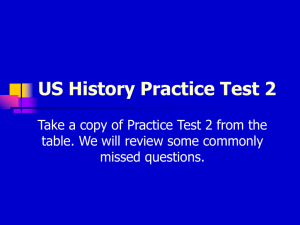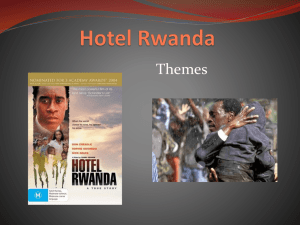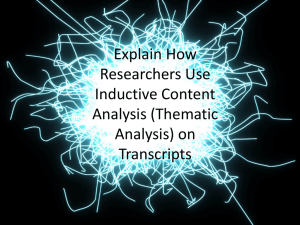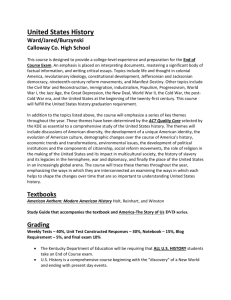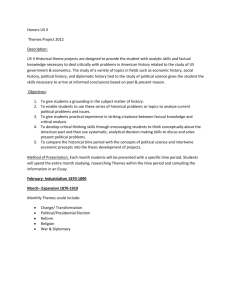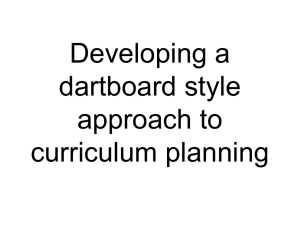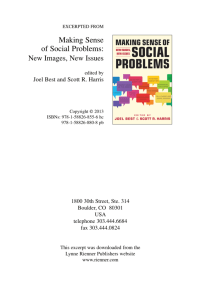Supplementary Table
advertisement
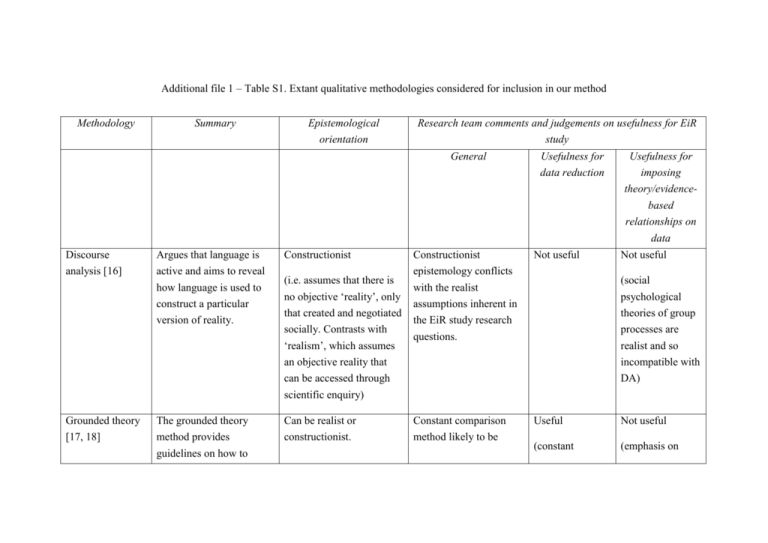
Additional file 1 – Table S1. Extant qualitative methodologies considered for inclusion in our method Methodology Summary Epistemological orientation Research team comments and judgements on usefulness for EiR study General Discourse analysis [16] Grounded theory [17, 18] Argues that language is active and aims to reveal how language is used to construct a particular version of reality. Constructionist The grounded theory method provides guidelines on how to Can be realist or constructionist. (i.e. assumes that there is no objective ‘reality’, only that created and negotiated socially. Contrasts with ‘realism’, which assumes an objective reality that can be accessed through scientific enquiry) Usefulness for Usefulness for data reduction imposing theory/evidencebased relationships on data Constructionist epistemology conflicts with the realist assumptions inherent in the EiR study research questions. Not useful Not useful Constant comparison method likely to be Useful Not useful (constant (emphasis on (social psychological theories of group processes are realist and so incompatible with DA) extract categories from the data, and to establish links between these. Analysis must be inductive – i.e. argues that categories inherent in the data should be uncovered by analyst, and that the analyst should not impose preconceived theoretical expectations on the data. Data are coded using welldefined procedures and analytic tools, including the constant comparison method, which involves comparing instances of similarly labelled concepts to identify commonalities in components of each of the emergent categories. helpful as a generic tool. comparison method may aid conceptualisation / development of emergent themes) inductive analysis inappropriate for linking theory and evidence-driven analysis) Content analysis [19] Involves coding data into discrete categories or themes, developing these themes inductively from the data, and, usually quantifying themed material. Realist Initial analysis stages are similar to thematic analysis, but differ in requiring analysis be inductive. Conversation analysis [20] Focuses on how Constructionist participants respond to each other in back-to-forth conversations, and how understanding of each other’s actions is negotiated within conversation. Focus on minutiae of conversation (e.g. speech delivery) unsuited to large dataset and likely to neglect content of GDG conversations. Unsuitable for analysis of interview data (would require exploration of Useful Not useful (data could be selected for analysis according to (emphasis on inductive analysis inappropriate for linking theory and whether they fit emergent themes) evidence-driven analysis) Not useful Not useful (does not offer ways to reduce dataset) interviewer’s speech). Unsuitable for tracking development of GDG processes over time. Thematic analysis [21] Broad, generic and Compatible with any versatile method for epistemological position ‘identifying, analysing and reporting themes within data’ ([21], p79). Interpretative Attempts to reveal phenomenological participants’ experiences analysis [22] and the meanings they attach to them, but acknowledges researcher’s interpretative role in this process. Phenomenological (i.e. assumes that meaning ‘exists’, but only through interpretation of events and experiences) Identifying themes in subset of data likely to be crucial as a start point for analysis and data reduction. Useful Useful (data could be selected for analysis according to whether they fit emergent themes) (themed data excerpts could be coded for constructs derived from theory/evidence) Might be useful for analysis of individual interview data. Less suited to GDG transcript analysis, which deals Potentially useful Not useful with the social interaction and not individuals’ experiences. (could aid coding (emphasis on of individual participants’ interview data) experiences may make theorydriven analysis inappropriate) Framework analysis [23] Involves coding and Compatible with any classifying data into epistemological position themes in accordance with an analytic framework that is either preconceived or developed iteratively. Resultant accounts of data can be explanatory and/or descriptive. Useful for organising data into themes. Useful Useful (can be used to organise data into themes) (allows for theoretical preconceptions, assumptions and hypotheses to be used in analysis)

